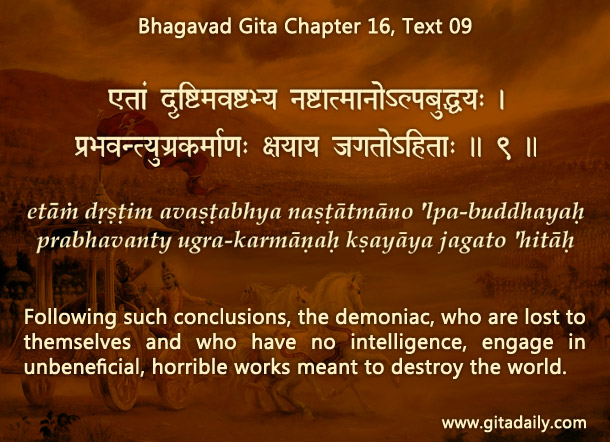Many people adopt a materialistic lifestyle without thinking about its implications. A materialistic worldview implies that we have come from nowhere because we didn’t exist before birth; we will go nowhere because we won’t exist after death; and while we live, we are successful if we get more things than others. And even if we do succeed, still, life ultimately ends in failure because we lose everything at death.
This conception of life is so gloomy as to be unbearable. We try to deny this gloominess by filling our lives with various activities – for example, we may busy ourselves in getting more and more material things, hoping to thereby feel good about ourselves. The resulting frantic race leads to brutal competition in which people inhumanly trample on each other to reach first to their dream goalposts. Materialism makes us see others not as persons but as tools for achieving our materialistic goals. Pertinently, the Bhagavad-gita (16.09) deems the materialistic worldview destructive.
When we experience materialism’s pernicious consequences, we start exploring spirituality. For such spiritual seekers, the Bhagavad-gita stands ready to share an inspiring and transforming worldview. It explains that we are at our core indestructible souls, and our life is meant for a glorious purpose: the evolution of our consciousness from material attachments to eternal spiritual love for the all-attractive supreme, Krishna. We evolve by cultivating service attitude towards Krishna and towards everyone in relationship with him. This service-centered vision of life focuses our consciousness on him, thus helping us feel more content. And it inspires us to become more humane towards others, for it reveals that we all are on a shared spiritual journey in which we can progress best by cooperating instead of competing.
Thus, what fosters our humanity is not materialism, but service-centered devotional spirituality.
To know more about this verse, please click on the image
Explanation of article:
Podcast:
Download by “right-click and save”
Think it over:
- What are the implications of a materialistic worldview?
- How do we deny the gloominess of the materialistic conception of life?
- How does the Gita’s spiritual worldview foster a humane outlook?


Hare Krishna. Thankyou very much for explaining so nicely
Hare Krishna
material life reduces human life to destruction